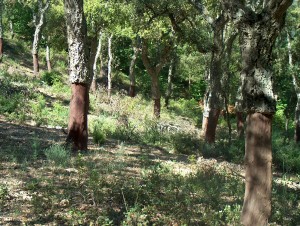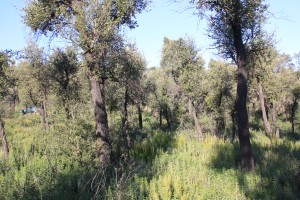 The climate change constitutes a serious threat for the conservation of the cork oak grove, the sustainable production of cork and the chain of value tied to this product. Between the main threats that predictably will affect to the cork oak, and whose effects already are being produced in the actuality, fits to stand out: the lower vitality and productivity because of a greater water stress, the increase of plagues, especially Coroebus undatus, and the greater frequency of large forest fires. Besides, these predictable impacts add to a normative frame in many respects unsuitable to this new context.
The climate change constitutes a serious threat for the conservation of the cork oak grove, the sustainable production of cork and the chain of value tied to this product. Between the main threats that predictably will affect to the cork oak, and whose effects already are being produced in the actuality, fits to stand out: the lower vitality and productivity because of a greater water stress, the increase of plagues, especially Coroebus undatus, and the greater frequency of large forest fires. Besides, these predictable impacts add to a normative frame in many respects unsuitable to this new context.
The forests of Quercus suber covers in the EU near of 20,000 Km2 and 65% of his area of world-wide distribution is mainly in Spain, Portugal, France and Italy, zones highly vulnerable to the climate change.
The main planned demonstrations of the climatic change in the Mediterranean western are a reduction of the pluviometry, an increase of the temperatures (more intense in summer) and an increase of the meteorological events extremes (waves of heat, strong droughts) that, as it has advanced and as it foresees , will produce the following impacts on the forests of cork oak.
These impacts will have a clearly negative impact on the productive, environmental and social functions of cork oak grove: lower production of cork and lower quality of the product, lower carbon sequestration capacity, loss of quality of the habitat for many species and biodiversity, increased erosion, and loss of landscape quality and value as a tourist and recreational environment. On the other hand, they will affect negatively on the conservation status of this habitat, currently rated as ‘unfavorable-inadequate’ (EUNIS).

These forests are closely linked to anthropic use, which for millennia has used for pasture, firewood and, above all, cork. At present, the conservation of forests Quercus suber involves the sustainable management and it is supported financially with cork production. In this context, it is necessary to incorporate the new technologies and management methods, from a holistic approach, to improve the ability to adapt them to climate change.
Therefore, the actions proposed in this project focus on implementing and demonstrating new techniques on forest management of the cork oak, with the establishment of demonstration plots. In addition, actions also focus on the transfer of knowledge and technology and the promotion of environmental awareness on the conservation of these forests.
Notably, the EU strategy for adapting to climate change adopted by the Commission in April 2013, aims to help shape a more resilient Europe to climate change; and in this sense, adaptation to climate change in forest systems is a central aspect in the policy of the European Union.
